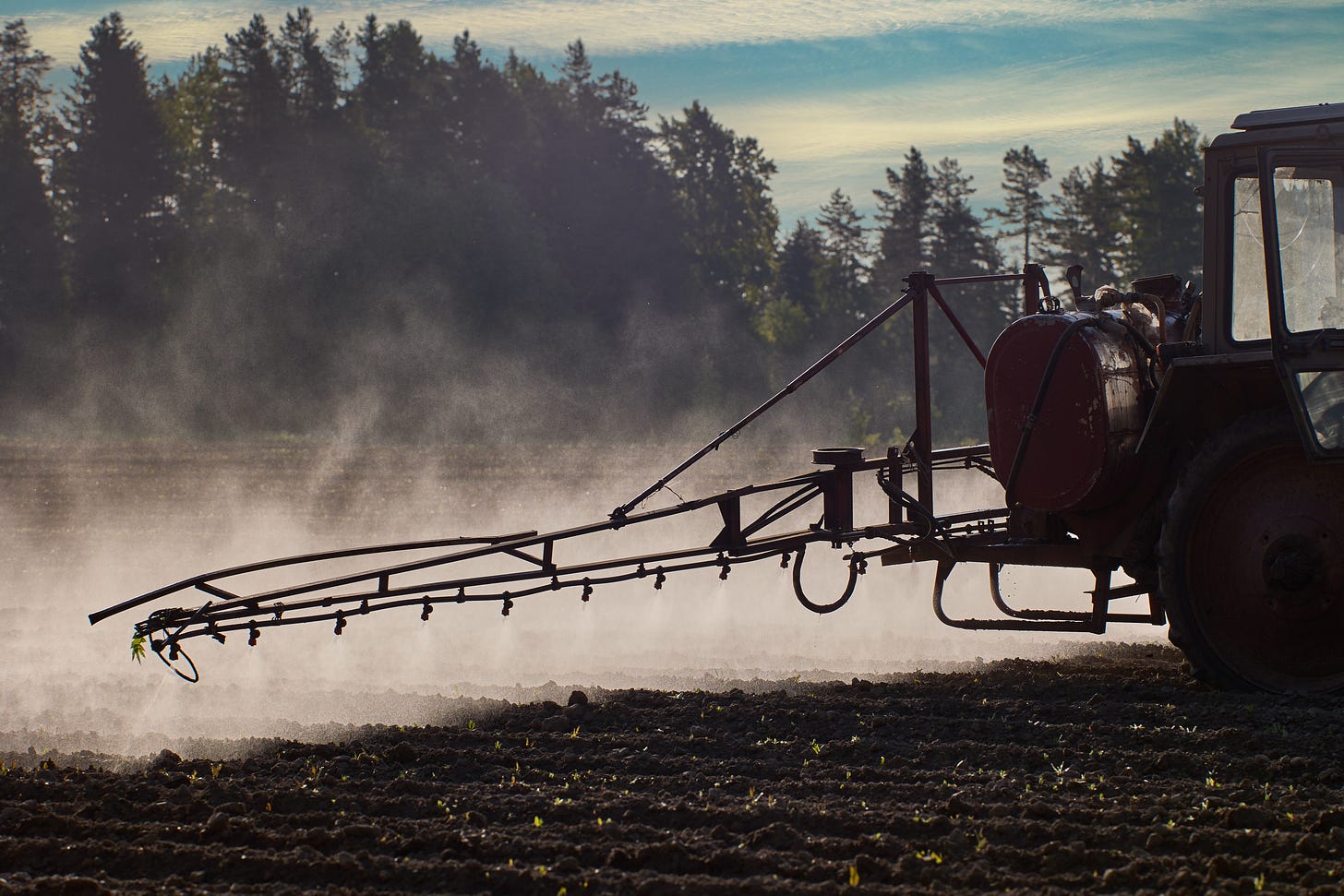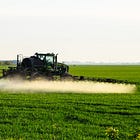North Dakota Becomes First State To Prohibit Lawsuits Against Pesticide Producers, Other States Considering Similar Laws
Profits from poisoning: it’s the American way.
In a win for big agricultural conglomerates and chemical producers, the state of North Dakota recently became the first state to prevent lawsuits being filed against these corporations, as companies such as Monsanto have been forced to payout billions to those arguing health issues stemming from pesticides such as Roundup. Now other states are pursuing similar action.
In March, Monsanto was forced to pay a hefty $2.1 billion to a man who said Roundup caused his cancer after a Georgia jury sided with the man, marking one of the largest payouts to date.
Monsanto said the verdict “conflicts with the overwhelming weight of scientific evidence and the consensus of regulatory bodies and their scientific assessments worldwide.” It added that the company will continue “to stand fully behind the safety” of Roundup products.
Lawsuit Information Center notes:
As of March 2025, Monsanto has reached settlement agreements in nearly 100,000 Roundup lawsuits. Monsanto paid approximately $11 billion. Bayer has accomplished this by negotiating block settlement arrangements with plaintiffs’ lawyers who have significant cases in the litigation… and by settling with plaintiffs before trial.
Although these settlements account for nearly two-thirds of all Roundup claims, Monsanto estimates that 67,000 active Roundup lawsuits remain. Most lawsuits have been filed in state court, but over 4,000 claims in the MDL Roundup class action lawsuit are still pending in California.
Now the state of North Dakota has passed the first-ever law sparing these companies from facing litigation.
On April 24th, Gov. Kelly Armstrong signed House Bill 1318 which says that a label approved by the Environmental Protection Agency (EPA) is sufficient enough warning to Americans about the hazards posed by these chemicals.
“[…] Any pesticide registered with the agriculture commissioner […] which displays a label approved by the United States environmental protection agency […] or displays a label consistent with the [EPA] carcinogenicity classification for the pesticide […] is sufficient to satisfy any requirement for warning or labeling regarding health or safety […] concerning the duty to warn or label, or any other common law duty to warn.”
Elizabeth Burns-Thompson, executive director of the Modern Ag Alliance, lauded the bill and said this will set a precedent for other states to follow suit. In a statement she said:
“Enacting HB 1318 into law is a resounding win for farmers and all North Dakotans. Governor Armstrong and the legislature have set a strong, bipartisan example for the country by preserving farmers’ access to essential crop protection tools that help keep farms competitive and grocery bills down.
Thanks to this legislation, North Dakota farmers will have the certainty they need to keep doing what they do best—growing the food we all depend on. This law sets the standard for states across America to pass legislation similar to HB 1318 and, ultimately, stand up for our farmers.”
The Modern Ag Alliance is a lobbyist front group founded by Bayer, according to their website, which “represents more than 100 agricultural organizations advocating for U.S. farmers’ access to the crop protection tools.” The group argues that the “science is clear” that glyphosate is safe, despite the rhetoric and advocates pushing to get the chemical banished from the U.S.
The lobbyist group claims: “The Modern Ag Alliance’s recent Ag Insights Survey found that 81% of all North Dakotans—including 83% of Republicans and 86% of Democrats—oppose litigation that could limit access to crop protection products.”
Other States Doing Something Similar
Last month, The WinePress reported on similar legislation in Georgia awaiting the Governor’s signature.
AUTHOR’s NOTE: I had errantly reported that Georgia would be the first state to enact such a law, which is incorrect.
Will Harris, the owner of White Oak Pastures in Bluffton, Georgia, a regenerative farm that does not use these chemicals, wrote an impassioned letter to Kemp urging him to veto the bill and says the bill does indeed take away the ability for Americans to sue companies such as Bayer or ChemChina.
“Chemical companies and legislators are claiming that this Bill is pro-farmer, because it protects farmer access to pesticides. This claim is false - farmers deserve to have the right to sue chemical manufacturers when their land, property, or family is injured by chemicals.
“Pesticide companies have no incentive to be honest about the risks of their products.”
Indeed, North Dakota is just the beginning. The National Agricultural Law Center is currently tracking a number of identical bills in other states.
Besides Georgia, these other states include Florida, Iowa, Mississippi, Missouri, Oklahoma, Tennessee, and Wyoming, though some of these bills have died-out. The most recent addition to the list is North Carolina.
In Iowa, for a second year in a row, the state House and Senate passed a bill to defend herbicide producers from litigation, but the bill ultimately fizzled out because it had to be taken up by another committee for debate and there was not enough support.
Senate President Amy Sinclair (R) argued, “Iowa feeds the world. And we need partners in that who aren’t constantly under threat of lawsuits for following the very laws governing the way they do business.” Senate Minority Leader Pam Jochum (D) contended that “this bill is stripping away the legal protections for Iowa farmers,” she said. “And they are the people who are getting diseases like cancer and Parkinson’s from chemicals they’re putting on their land that we know [are] causing it.”
Sen. Jeff Edler (R) tried to claim that the bill closes an over-abused loophole but still allows for lawsuits. “It’s about, ‘How can we win? How can we win with the least amount of effort?’ Well you know what, when you can sue a company because they can’t do a darn thing to protect themselves, that’s a lot easier than proving causation that doesn’t exist.”
Iowa Public Radio reported: Democrats also pointed out that Iowa was recently found to have the fastest-growing rate of new cancers in the country. Report authors said that could be linked to Iowa’s high rate of binge drinking, but others believe agricultural chemicals could be a main culprit.
However, Bayer is now trying to resurrect the bill and officials have since been in talks with Governor Kim Reynolds and House and Senate leadership, Farmers’ Advance reported.
Matthias Berninger, Bayer senior vice president for public affairs and science and sustainability, said in an April interview,
“This is like a win-win, where we both win or where we both lose, which is why I'm hopeful that we can convince the decision-makers in the state to stand by us and ultimately to stand by their rural communities.
"We see states moving in the right direction. And this basically is what we are asking the Senate and the House in the state of Iowa to do as well. That's the reason why I'm here. Basically, being very clear that we are running out of time and we need a signal."
Meanwhile in Missouri, lobbyists are funding advertising campaigns to persuade residents to support the legislation to defend the big-ag companies. The advertisements deceitfully claim that supporting this legislation would help President Donald Trump protect American farms from China’s clutches, even though the House and Senate bills have nothing to do with that. KOMU reported: Ads across Missouri are all over websites, social media platforms, and billboards urging people to call on their state lawmakers to help President Trump protect American farmers from China by supporting House Bill 544 and Senate Bill 14. These bills have absolutely nothing to do with China or farmland. They’re about pesticides, specifically the labels on them.
In Florida, the House Civil Justice and Claims Subcommittee passed HB 129 in April, another bill that would protect herbicide producers from lawsuits. The Modern Ag Alliance is encouraging the state to pass the bill. The lobbyist group claims “80% of Floridians, including 96% of farmers, are more likely to support leaders who stand with farmers on ag policy.”
North Carolina is the most recent state to tackle such a bill. The state’s Senate Agriculture, Energy, and Environment Committee approved an amended version of the North Carolina Farm Act of 2025, and it was delivered to the Senate Judiciary Committee this week.
Port City Daily pointed out: Bayer helped draft a section of the federal Farm Bill last year aimed at limiting pesticide liability, according to the Washington Post. Its lobbyists have pushed bills with similar language in around a dozen states.
“Proposed legislation at the state and federal level — such as bills being considered in a number of states — would simply ensure that any pesticide registered with the EPA and sold under a label consistent with its determinations is sufficient to satisfy requirements for health and safety warnings,” a Bayer spokesperson told Port City Daily.
AUTHOR COMMENTARY
Question, Bayer: if your products are so safe, then why are you lobbying state and federal governments to pass legislation to put warning labels on packaging that acknowledge your chemicals are toxic and harmful to one’s health?
1 Samuel 8:3 And his sons walked not in his ways, but turned aside after lucre, and took bribes, and perverted judgment.
Eh, who cares if people are getting poisoned and suffering from a myriad of health issues from glyphosate and these other chemicals? As long as Big-Ag gets its cut and is allowed to keep profiting from the poisoning, then who cares?
Profits from poisoning: it’s the American way. But don’t worry, your food is so safe we the government has to put warning labels on it so that you consent to eating poisoned food and know the risks!
Though some of these bills have failed or stalled-out, the victory in North Dakota sets a dangerous precedent, especially if Bayer and other companies want to countersue in defamation suits. It’s important to note that with the bills that did fail, it was mostly because they ran past the deadline. There is fairly strong bipartisan support, for the most part, in most of these legislative sessions.
This also creates a problem for the MAHA movement. Even though I am on record criticizing Kennedy and MAHA, undercutting any attempts at the federal level to change the health standards in this country. The fact is that while I am staunch advocate for regenerative and organic practices, using the conventional poisons on these large-scale farms is simply too profitable and decoupling from them would wreck the industry and the broader economy as a whole, and so therefore it cannot be allowed.
[7] Who goeth a warfare any time at his own charges? who planteth a vineyard, and eateth not of the fruit thereof? or who feedeth a flock, and eateth not of the milk of the flock? [8] Say I these things as a man? or saith not the law the same also? [9] For it is written in the law of Moses, Thou shalt not muzzle the mouth of the ox that treadeth out the corn. Doth God take care for oxen? [10] Or saith he it altogether for our sakes? For our sakes, no doubt, this is written: that he that ploweth should plow in hope; and that he that thresheth in hope should be partaker of his hope. (1 Corinthians 9:7-10).
The WinePress needs your support! If God has laid it on your heart to want to contribute, please prayerfully consider donating to this ministry. If you cannot gift a monetary donation, then please donate your fervent prayers to keep this ministry going! Thank you and may God bless you.











15 He that justifieth the wicked, and he that condemneth the just, even they both are abomination to the LORD.
Proverbs 17:15
10 For the love of money is the root of all evil: which while some coveted after, they have erred from the faith, and pierced themselves through with many sorrows.
1 Timothy 6:10
Those verses come to mind and are good attacks against this evil, but 1 Samuel 8:3 is like the finishing blow!
The American Way is Satan’s Way, and this is why God has lifted His hand of blessing and protection off of this land and is now going to destroy it!
God, please take us home sooner than soon!
" . . . doing what they do best—growing the food we all depend on."<---No, no. We don't need or want glyphosate on the soil or the food supply. It's poison.
Apparently, those involved in this decision need additional information. That, or their palms got greased. (so to speak)